Distinguished Critique: Superman: Red Son Review
This wonderfully imaginative take on the Superman mythos reconstructs the Man of Steel's world in an engaging, conflict-driven series
—by Nathan on September 11, 2023—
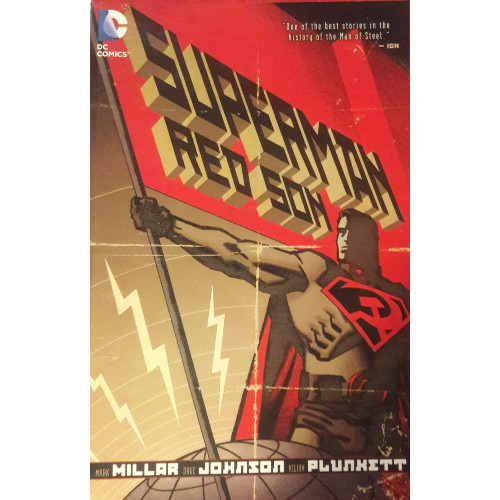
Imagine, if you will, a small rocket ship crashing into farm fields, the baby within adopted and raised by two loving parents to reflect the ideals of his adopted nation. Imagine that baby growing into a young man, discovering incredible powers, moving from the farm to the city, and becoming a champion and protector. Imagine that young man upholding his country’s principles against all who would say otherwise.
Now imagine that rocket ship crashing, not in rural Kansas, but in a commune in Ukraine. Imagine that young man moving, not to Metropolis, but to Moscow. Imagine that hero, instilled in Soviet ideals by his patriotic parents, becoming Joseph Stalin’s right-hand man, his inevitable heir, and the key to Soviet expansion.
Truth? Justice? Maybe as how our Soviet Superman sees it. The American way? Well, you can forget about that one.
Superman: Red Son
Writer: Mark Millar
Pencilers: Dave Johnson, Kilian Plunkett
Inker: Andrew Robinson, Waldon Wong
Colorist: Paul Mounts
Letterer: Ken Lopez
Issues: Superman: Red Son #1-3
Publication Dates: June-August 2003
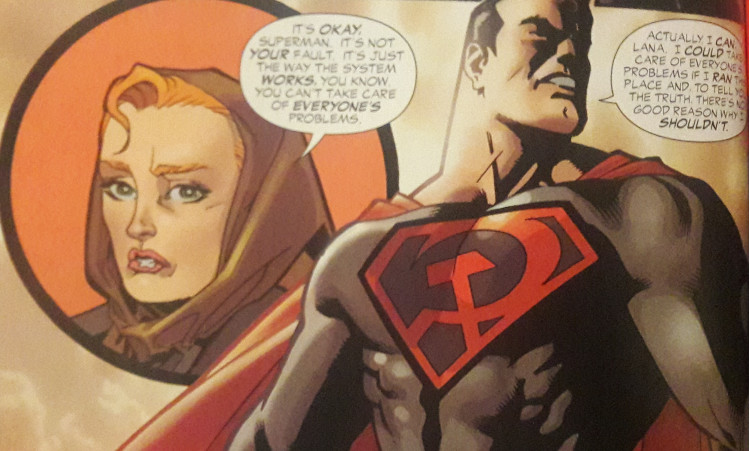
Note: save for some minor edits, this blog is the same as it was when I originally posted it to Hubpages
A difference of 12 hours, Millar posits, is all the time it would have taken for Superman’s rocketship, blasted from doomed Krypton, to land in a wildly different part of the world. The original time period, we can assume, would be relatively the same as when Superman first made his comics debut. In Red Son, he simply lands on another side of the planet. Indoctrinated in Socialist dogma, he becomes a champion for the USSR, defending communism and watching America with his telescopic vision. Forget the nuclear bomb. As Eisenhower says early in the series, "The Cold War just evolved into a whole new animal."
The concept is simple, and brilliant. All Jor-El needed to do was launch his son from a slightly different time than he did in the original comics…and all of history would change. The alteration to Superman’s origin is minor yet, as Millar and his artists showcase, radically significant. Here, we have a world where there is no Clark Kent, no mild-mannered reporter working for the Daily Planet. Lois Lane is now Lois Luthor, married to Lex Luthor, the smartest man in the world. Enemies such as Bizarro, Mentallo, and the Parasite aren’t the results of mad scientists or random accidents but Lex’s exceedingly erratic attempts at wiping out the Soviet Superman.
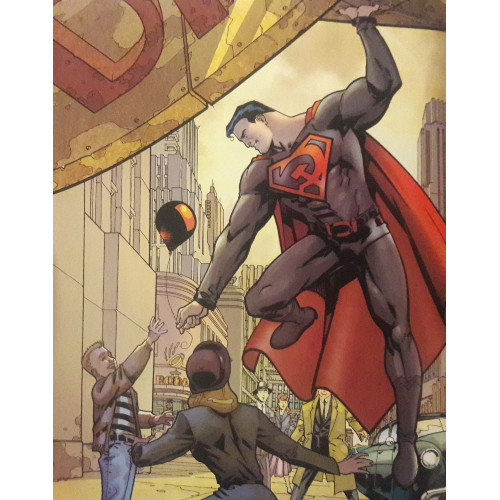
Millar’s narrative is an "Elseworlds"-style story arc, where events happen differently in a parallel universe than in regular DC continuity, but it’s not necessarily a "What If-?" type of tale. Naturally, the whole premise is predicated on the question "What if Superman landed in the Soviet Union?" but the following story seems cemented on answering the Superman facet of the question, not dealing with the ramifications of Superman not landing in America. In certain cases, one may extrapolate on the idea–Lex Luthor is still an ambitious scientist, dedicated to destroying Superman, even if he isn’t targeting a fellow American. But Superman landing in the USSR does not explain why Lois would marry Lex, Jimmy Olsen becomes a government agent, or Batman is a Russian terrorist instead of a rich orphan in Gotham. Millar does not seem as interested in a wholesale "alternate universe" style of story. It’s certainly a fine way to tell the tale, but heading into it, I think a part of me expected a better grasp on the impact of a non-American Superman on Supes’ regular supporting cast.
Millar works around this by transposing several of his cast members to Russia and reimagining them as Soviet citizens. Lana Lang becomes Lana Lazarenko, an old friend of Clark’s from the commune where he grew up, turning into a dedicated follower of the Soviet Superman; Pete Ross, historically another of Clark’s Smallville friends, is reinterpreted as Pyotr Roslov, head of the KGB and Superman’s rival for Stalin’s approval. These changes feel natural to the story itself; by distancing himself from creating an alternate world where Superman’s arrival in Russia impacts the cast differently than if he landed in America, Millar has more freedom to construct a brand new world rather than adhering to the narrative logic of a previous realm.
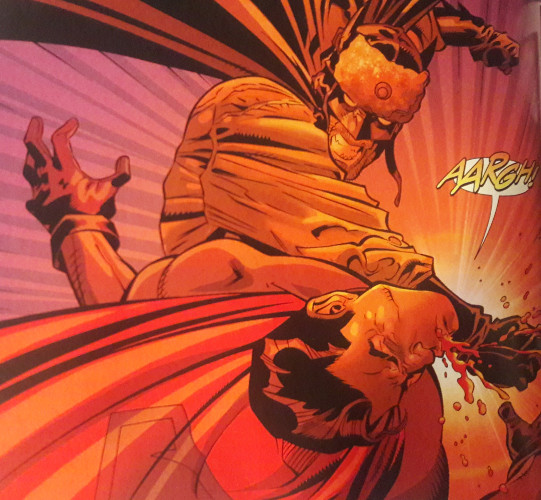
For most of the series, Millar utilizes this freedom nicely. He’s able to navigate this new space without tampering with previously existing rules. In this regard, the series feels much like his work on The Ultimates, where Millar introduced an alternate version of the Avengers to Marvel’s Ultimate Universe. He’s a child with a box of toys, and other than sticking to a handful of basic rules–Superman has to have crash-landed from Krypton, Batman is a masked vigilante, Wonder Woman is a warrior princess, etc.–Millar is allowed great freedom to play as he wishes.
Outside his primary cast, Millar delivers a plethora of Easter eggs which readers and DC fans may find engaging. Hal Jordan is cast into the mold of a highly imaginative fighter pilot and former prisoner of war; reference is made to a secret base constructed by Superman which he refers to as a "fortress"; characters like Oliver Queen and Iris and Barry Allen are depicted as Daily Planet employees. Some of the references are subtle, some more obvious, but all intend to tickle the fancy of any comic book reader appreciating the story.
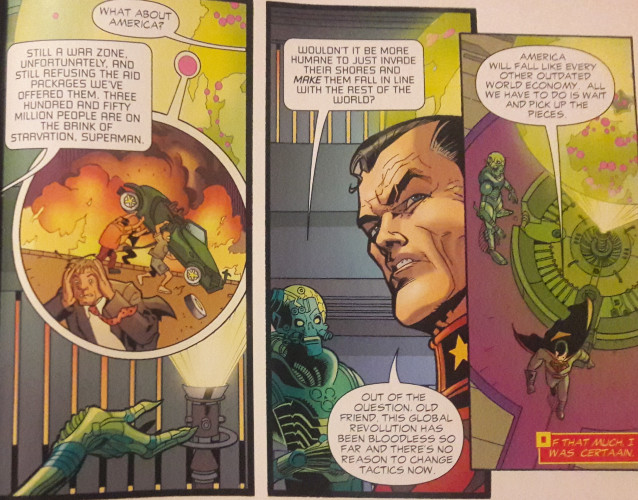
Much as I would have enjoyed watching Millar toy with the possibilities of a non-American Superman’s impact on history as they may have occurred within DC’s history–would Jimmy Olsen really have become a government agent just because he never met Clark Kent?–I feel as if a hardcore exploration of how the universe would be different would undermine Millar's theming. Millar’s story is one which places you, the reader, in the highly uncomfortable position of wrestling with this version of the Man of Steel. This isn’t just the regular "truth, justice, and the American Way" Superman you may have grown up with (though, admittedly, even the Superman from main DC continuity has changed his slogan to end with “and a better tomorrow”), fighting in the U.S. for the safety of the planet. This is far from the Superman who once rejected his Kryptonian heritage in favor of his American identity. This is a Superman who, foremost, battles for Soviet ambitions. Sure, he rarely has qualms about protecting non-communist countries when the need arises, such as when a satellite falls to Earth or when Luthor’s Bizarro runs amok. But his primary goal is the ascendancy of communism as a world power–correction, the only world power.
And therein lies the struggle, especially if you’re reading with a Western perspective. It isn’t that Millar’s Superman is "evil." I think it would be all too easy to enter Millar’s tale with that notion, especially as his Kal-El fights for a country regularly seen as an enemy of America in the time period Red Son takes place. But Millar never makes Superman radically villainous, a testament to his writing. One aspect of Millar’s Ultimates series I disliked was his take on Captain America, who became a jingoistic jerk; it felt almost as if by labeling Steve Rogers "Captain America" and thrusting him into the 21st Century, Millar turned him into a stereotype of everything an ultra-patriot shouldn’t be. Millar keeps the same from happening to his Soviet Superman–yes, Kal-El’s all for expansion, but he has reasons other than world domination. Looking at the world through telescopic eyes, he believes he has a solution to better people’s lives everywhere by enforcing the principles originally instilled in him.
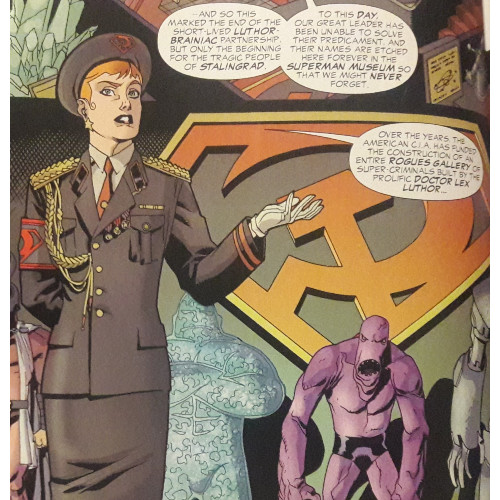
Contrast this with Millar’s take on Luthor: the scientist is, as always, possessed by the goal of ending Superman, disguising his obsession with patriotism. But we don’t get a Luthor as envisioned by John Byrne, who made the villain a prominent businessman, or even Mark Waid, whose Birthright series reimagined Luthor as a fellow Smallville inhabitant paralleling Clark’s own life journey. Millar’s Luthor is truly determined, creating all manner of monsters over the decades, spurning Lois, and locking himself in his lab for untold periods of time. Like Byrne and Waid’s versions, Millar’s Luthor is driven by a deep-seated selfishness and arrogance, yet born from slightly different origins.
Byrne and Waid’s versions of Luthor hate Superman because of his impact on Metropolis, a city Luthor vehemently grasps and refuses to share. Luthor in Red Son flaunts his own genius–when we first meet him, he’s learning Urdu and playing at least seven simultaneous games of chess. So to have someone outwit him as Superman does, or best his projects and creations with his strength, is an outrage to the scientist. Luthor never calls himself arrogant, but he clearly views himself through a perfected lens which Superman smudges…or even outright cracks. Millar’s Luthor cannot allow his intellect and impact to be called into question.
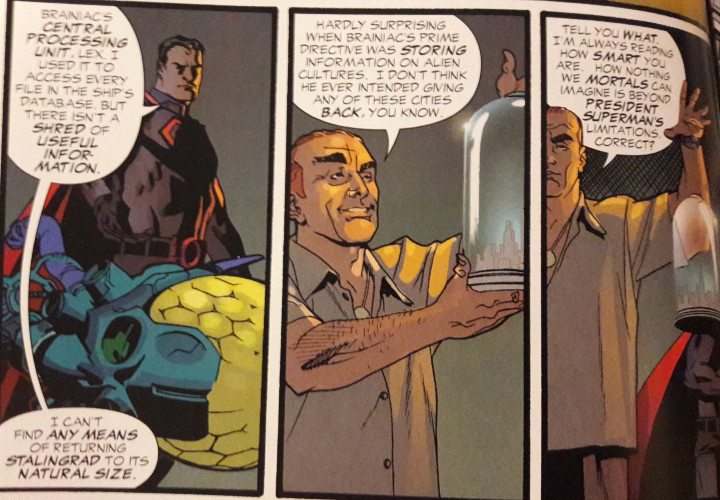
So who are we supposed to root for in this series? The Soviet Superman who genuinely believes his nation possesses the right method of governing the world? Or the American scientist whose hubris endangers others? Millar’s twist on his two main characters is subtle enough, with Superman and Luthor thrown into conflict over ethnic and ethical matters. Yet similarities are depicted just as much as the differences, allowing Millar to ask whether we’re following the tale of two protagonists or two antagonists. Men with power, backed by the legitimacy of countries hanging onto their every move, accusing each other of the very superiority they themselves may possess, with people dependent upon their next act…are they really so different after all?
Every so often, Millar lets a few less-than-subtle references and pieces of dialogue slip into his scripts. Luthor at one point mentions he believes "Superman and I would have been the best of friends if he’d popped up in America"; the comment is somewhat amusing, pointing to Luthor’s divergence from reality, but a tad heavy-handed. Elsewhere, Martha Kent pops in for a few panels, commenting on how she’s glad husband Jonathan isn’t around to see the birth of this Soviet Superman. Again, the point is blunt: Martha views the concept of Superman exceedingly differently than if she had raised the boy herself. As an Easter egg, her appearance is mildly interesting, but as a method of adding commentary, Millar’s efforts feel stunted.
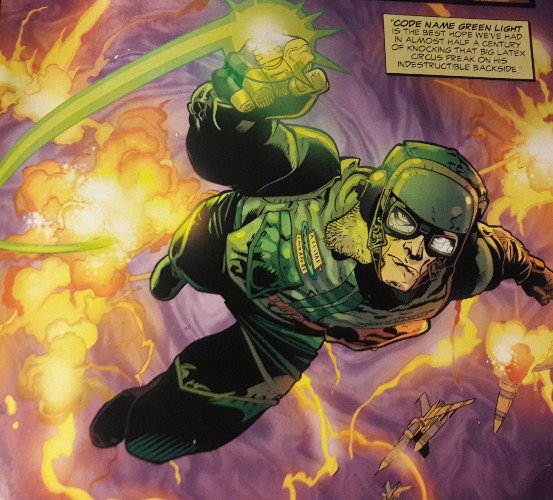
Yet for most of the series, Millar shines. He creates a highly engaging Superman/Lex Luthor dichotomy, split across national and political lines, wrenching their decades-long war into new territory (in both a figurative and literal sense). The reader is genuinely asked to grapple with the efforts and intentions of both men and struggle to understand who’s approaching the conflict correctly, if either man is. Millar constructs a view of leadership through the intentions and actions of both men, commenting on not only their capability to serve and save, but on the methods by which they provide aid. A little stunted and heavy-handed at moments, Red Son is an otherwise delightful take on Superman and his world, providing not so much a "What If-?" scenario but rather a clever, often poignant reconstruction of the world and characters Superman fans are generally accustomed to.